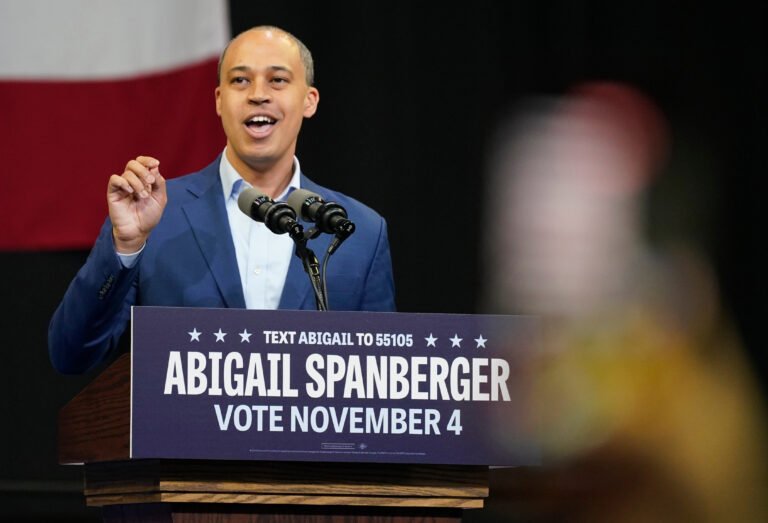
In an interview last weekend, Kamala Harris predicted that someday there would be a woman in the White House. She then hinted it might be her: “I am not done,” she said.
To which America collectively sighed, “Please, for the love of God, don’t do this to us again!”
I say this as someone who rode the Harris rollercoaster. I was skeptical at first, then briefly impressed when she didn’t implode in the summer of 2024. Ultimately, we received a brutal reminder of why President Trump is still the equivalent of a political wrecking ball.
But this isn’t just about Harris. I’m just going to say the thing I probably shouldn’t say: If Democrats really believe Trump and MAGA represent an existential threat to liberal democracy, they should try something different next time. Like, nominating a man.
Before you start sketching out your think piece, I am not saying this from a place of misogyny. I supported Sarah Palin back in 2008 (a confession that ages as well as milk) and pulled the lever for Nikki Haley in the 2024 primary.
My point is simpler and sadder: There’s a growing sense that the Democratic Party has, to borrow James Carville’s phrase, “too many preachy females.” In a political era obsessed with toughness and masculinity, that perception is electoral kryptonite.
For example, one participant in a Third Way focus group conducted in 2024 said, “I think being a masculine leader is, like, outlawed in the Democratic Party right now.”
This might sound ridiculous, but the feelings — and the findings — both seem to align. Trump is 0-for-1 against male Democrats. Hillary Clinton and Kamala Harris, while both capable, couldn’t close the deal. And yes, I acknowledge the counterarguments. That is a small sample size, and correlation isn’t causation. Yes, Hillary won the popular vote and Trump would have trounced Joe Biden in 2024 if he had stayed on the ticket. And yes, Harris got handed a tough assignment at a late date.
But still, it is a pattern that feels like fate.
The thing is, Trump’s obsession with dominance and cruelty, coupled with the backlash to the #MeToo movement, has changed attitudes. For example, a 2024 PRRI survey found that 73 percent of Republicans now agree that society has become “too soft and feminine” — a belief that doubtless affects people’s voting decisions. It is telling that this number is up 13 points since 2016.
And it’s not just white Republican men who are less inclined to vote for woman. Sarah Longwell from The Bulwark held focus group panels last fall that revealed a bleak consensus, even among Democratic women.
A Georgia voter put it bluntly: “Women … don’t want to see another woman in office.”
Another woman, a black Clinton-Biden voter, added, “I feel like Kamala wouldn’t win … because just in the black community, there’s still a struggle with men [wanting] to see women as leaders.”
Perhaps it’s no coincidence that our culture has recently turned the word “Karen” into a national punchline — a shorthand way to call a woman bossy, humorless, and entitled. Carville, ever the Cajun oracle, summed up the perception bluntly: Too many Democrats sound like someone’s scolding aunt. “Don’t drink beer, don’t watch football, don’t eat hamburgers, this is not good for you. … You’ve got to eat your peas.”
Fair or not, that image has infected how voters perceive Democratic women.
Case in point, a recent episode of the Commentary podcast, focusing on Tuesday’s elections, was titled, “Democrat Karens and Islamic Zohrans.”
The reference to “Karens” was in regards to the two Democratic women running for governor right now, New Jersey’s Mikie Sherrill and Virginia’s Abigail Spanberger. Both women are accomplished, grounded, and capable — yet, both are running campaigns so cautious that they might as well be wrapped in bubble wrap.
Both will probably still win (although Sherrill’s race is too close, especially when you consider that New Jersey is a Democratic state and 2025 should be a Democratic year), but no one will remember how.
Meanwhile, up in Maine, there’s an incipient 2026 Democratic Senate primary where a scandal-plagued upstart named Graham Platner is somehow trouncing Gov. Janet Mills by double digits in a recent poll.
That’s not normal politics. That’s a symptom — or a sign.
And sure, part of the story might be that Platner is an outsider running against an aging establishment politician. But let’s not pretend his identity (oysterman, tattooed veteran, Joe Six-Pack) isn’t at least part of his appeal.
The point is this: Until the fever breaks, Democrats might want to give more consideration to what they’re saying (please, no more words like “birthing person” or “cisgender”) and to who is speaking.
This is especially true when it comes to renominating a particular 2028 presidential candidate. Harris can insist she’s “not done.” But maybe, for the sake of the republic, someone should politely tell her that we are.
Matt K. Lewis is a columnist, podcaster, and author of the books “Too Dumb to Fail” and “Filthy Rich Politicians.”

